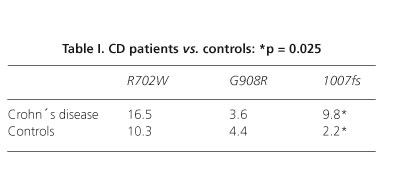Meu SciELO
Serviços Personalizados
Journal
Artigo
Indicadores
-
 Citado por SciELO
Citado por SciELO -
 Acessos
Acessos
Links relacionados
-
 Citado por Google
Citado por Google -
 Similares em
SciELO
Similares em
SciELO -
 Similares em Google
Similares em Google
Compartilhar
Revista Española de Enfermedades Digestivas
versão impressa ISSN 1130-0108
Rev. esp. enferm. dig. vol.103 no.9 Madrid Set. 2011
https://dx.doi.org/10.4321/S1130-01082011000900016
LETTERS TO THE EDITOR
NOD2/CARD15 gene mutations in patients with inflammatory bowel disease in Valladolid
Mutaciones de NOD2/CARD15 en pacientes con enfermedad inflamatoria intestinal en Valladolid
Key words: NOD2/CARD15 gene mutations. Inflammatory bowel disease. Crohn's disease. Ulcerative colitis.
Palabras clave: Mutaciones de NOD2/CARD15. Enfermedad inflamatoria intestinal. Enfermedad de Crohn. Colitis ulcerosa.
Dear Editor,
Having read the study of Barreiro et al. (1) published recently in the Spanish Journal of Gastroenterology, we would like to report our results up to date, preliminarily presented in the SEPD national meeting in Granada in 2006 (2). Barreiro et al. review and report how often NOD2 gene mutations are detected in studies in different places of Spain (Asturias, Barcelona, Galicia, Madrid and Toledo) (1). We have also tried to study the frequency of NOD2 gene mutations in inflammatory bowel disease in patients from Valladolid and to establish the association of these polymorphisms with Crohn's disease (CD) location or behaviour. We phenotyped R702W, G908R y L1007fs polymorphisms of the NOD2 gene in 110 CD patients and 104 ulcerative colitis patients from "Hospital Clínico Universitario" and "Hospital Universitario Río Hortega", both in Valladolid, and matched the results with a 137 blood donors control group from the same city. We found a NOD2 mutation carrier frequency of 29.6% among CD patients, 16.1% among UC patients and 16.9% among controls. The difference between CD patients and controls was statistic significant (p = 0.034). 1007fs was the most often detected polymorphism in CD patients (Table I). 1007fs was also more often found among non-luminal disease and in patients who had surgery. Colonic was the most often location in CD patients carrying R702W, and ileal was the most often location and in CD patients carrying 1007fs.
The frequency of NOD2 gene mutation carriers among our CD patients was similar to the ones reported in other studies in the Iberian Peninsule with the exception of the one of Asturias that reported a lower frequency with similar proportions of the different polymorphisms. However, stronger differences are dealing with the frequency of mutations among general population at every region. This could limit the clinic value of phenotyping these mutations.
Luis Ignacio Fernández-Salazar1, Emma Gómez-González2, Benito Velayos1, Jesús Barrio3,
José Manuel González1, Eduardo Arranz2 and José Antonio Garrote2,4
1Department of Digestive Diseases. Hospital Clínico Universitario de Valladolid.
2Grupo de Inmunología de las Mucosas. Pediatric and Immunology Areas - IBGM. Universidad de Valladolid.
3Department of Digestive Diseases. Hospital Universitario Río Hortega. Valladolid.
4Research Unit. Hospital Clínico Universitario de Valladolid (IECSCYL). Valladolid, Spain
References
1. Barreiro de Acosta M, Mendoza JL, Lana R, Domínguez Muñoz JE, Díaz-Rubio M. NOD2/CARD15: geographic differences in the Spanish population and clinical applications in Crohn's disease. Rev Esp Enferm Dig 2010;102(5):321-6. [ Links ]
2. Fernández Salazar LI, León Arroyo A, Goyeneche ML, Gómez González E, Velayos Jiménez B, González Hernández JM, et al. Mutaciones de NOD2/CARD15 en pacientes con enfermedad inflamatoria intestinal en Valladolid. Rev Esp Enferm Dig 2006;98(Supl. I):52. [ Links ]















